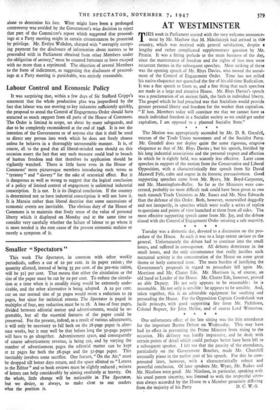AT WESTMINSTER
THIS week in Parliament started with the very welcome announce- ment by Mr. Mayhew that M. Mikolajczyk had arrived in this country, which was received with general satisfaction, despite
lengthy and rather complicated supplementary question by Mr. Piratin. It was a fitting prelude to the main business of the day, since the maintenance of freedom and the rights of free men were recurrent themes in the subsequent speeches. Most striking of these was the opening speech of Mr. Rhys Davies, who moved the annul- ment of the Control of Engagement Order. Time has not stilled his native eloquence nor quenched the fire of his old-time Radicalism. It was a fine speech to listen to, and a fine thing that such speeches are made in a large and attentive House. Mr. Rhys Davies's speech was a proclamation of an ancient faith, the faith in individual liberty. The gospel which he had preached was that Socialism would provide greater personal liberty and freedom for the worker than capitalism. " If hon. Members today will convince me that we cannot have as much individual freedom in a Socialist society as we could get under capitalism, I am opposed to a planned Socialist State."
* * * *
The Motion was appropriately seconded by Mr. D. R. Grenfell, veteran of the Trade Union movement and of the Socialist Party. Mr. Grenfell does not deploy quite the same rigorous, eruptive eloquence as that of Mr. Rhys Davies ; but his speech, fortified by his long industrial associations and the personal respect and affection in which he is rightly held, was scarcely less effective. Later came speeches in support of the motion from the Conservative and Liberal. Opposition, with a characteristically fine speech from Sir David Maxwell Fyfe, calm and cogent in its forensic persuasiveness. Good supporting speeches came from Mr. Byers, Mr. Boyd-Carpenter, and Mr. Manningham-Buller. So far as the Ministers were con- cerned, probably no more difficult task could have been given to two such staunch Trade Unionists as Mr. Isaacs and Mr. Ness Edwards than the defence of this Order. Both, however, stonewalled doggedly and not inexpertly, in speeches which were really a series of replies to questions and points of view launched at them from all sides. The most effective supporting speech came from Mr. Jay, and the debate closed with the Control of Engagement Order securing a safe majority.
* * * * Tuesday was a domestic day, devoted to a discussion on the pro- cedure of the House. As such it was to a large extent caviare to the general. Unfortunately the debate had to continue into the small hours, and suffered in consequence. All debates deteriorate in the small hours, and the only circumstance that really justifies such nocturnal activity is the concentration of the House on some great theme or hotly contested issue. The main burden of justifying the Government's proposals in regard to procedure fell upon Mr. Morrison and Mr. Chuter Ede. Mr. Morrison is, of course, an old hand as Leader of the House. Mr. Chuter Ede, however, proved an able Deputy. He not only appears to be reasonable : he is reasonable. He not only is sensible : he appears to be sensible. And, taken together, this is an admirable equipment for soothing and persuading the House. For the Opposition Captain Crookshank was facile princeps, with good supporting fire from Mr. Pickthorn, Colonel Ropner, Sir John Mellor, and of course Lord Winterton. * * * * One unfortunate effect of the late sitting was the thin attendance for the important Burma Debate on Wednesday. This may have had its effect in preventing the Prime Minister from rising to the occasion. His delivery was hardly impressive, and he dealt with certain points of detail which could perhaps better have been left to a subsequent speaker. I felt too that the paucity of the attendance, particularly on the Government Benches, made Mr. Churchill unusually piano in the earlier part of his speech. For this he com- pensated later, however, with a characteristically robust and powerful conclusion. Of later speakers Mr. Wyatt, Mr. Raikes and Mr. Nicolson were good. Mr. Nicolson, in particular, speaking with his usual patent sincerity, was listened to with the respectful atten- tion always accorded by the House to a Member genuinely differing


































 Previous page
Previous page